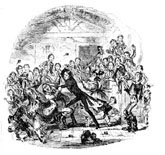
The Nowhere Between Life & Death
THE FETUS AS HOMO SACER — PART I
James George Frazer’s turn-of-the-20th-century work The Golden Bough begins with a curious scene. In ancient Italy there was a cult to Diana presided over by a priest called rex Nemorensis, King of the Grove. Under the golden boughs of the grove’s trees, sacred to the goddess, dwelt the priestly king. He was, by definition, a murderer. The only way to become King of the Grove was by killing whoever happened to be occupying the office at the time. And the only way to remain king was to fend off all comers thereafter. The king was fair game, standing outside all other laws and living in a state of limbo between life and death. As such, kingship at this place implied masterly ruthlessness. Hardening one’s heart and killing a total stranger was the sole method of becoming rex Nemorensis. To become king by killing was likewise to sign one’s own death warrant, to slip outside the legal framework of men and live in a wild borderland where sacrificial officiant and victim were one and the same.
Anyone who has followed abortion politics in the United States these past 50-plus years will recognize a resemblance between the King of the Grove and the unborn child. The child is, of course, an innocent person, whose life is a gift from God. But unborn children are also in a state of existential limbo: Unlike the rest of us, they have no legal protection from contract killing. Every baby in the womb, just like Diana’s priests under the golden bough, may be murdered without legal consequence.
Depending on the state, killing a pregnant woman may lead to charges of double homicide or manslaughter, and the 2004 Unborn Victims of Violence Act provides for criminal prosecution at the federal level of those who harm children in utero. But it is still perfectly legal to hire an abortionist to dismember a baby in the womb in the name of personal choice. The unborn are thus overshadowed by death, existing in a warm, and yet cold, borderland between what must never be — the shedding of innocent blood — and what, our society tells us, must be — namely, the sacrificing of children so that individual sovereignty remains intact. Diana required the priest who served her to relinquish his life even as he lived in her grove. The modern state requires that the child in utero have no legal personhood so that his mother may free herself of him at any time during his gestation.
This is why we cannot stop the American abortion holocaust. This is why the ideologues of the liberal state, those who hold positions of power in government, media, academe, and virtually every other modern institution, cannot recognize the personhood of the unborn child. Were modern liberals to admit that the unborn are as human as they are, and entitled to the same rights they enjoy, the entire edifice of liberalism would collapse. But the reason for this is much more complex than is normally argued. In America today, it is the “fetus” — the babe who has not yet drawn air into his tiny lungs but who yearns, like all his brothers and sisters of any age, to live, to grow, and to thrive — whose ambiguous existence guarantees the rest of us our full complement of liberal rights. The fetus is the negative terminal of our liberal political circuitry, the ground of our hardwired rights. If the fetus is not killable, then we are not, in the liberal scheme, free. How can this be?
You May Also Enjoy
Jim Holman is a Catholic who knows his money and talents are only a loan, and that he will have to account for them on Judgment Day.
Justice Ginsburg, a powerful abortion advocate, has been working for 20 years to reduce those populations she doesn't "want to have too many of."
Shakespeare showed what murder does to murderers. We, too, can examine what abortion has done to abortionists and the mothers and fathers of those killed.

